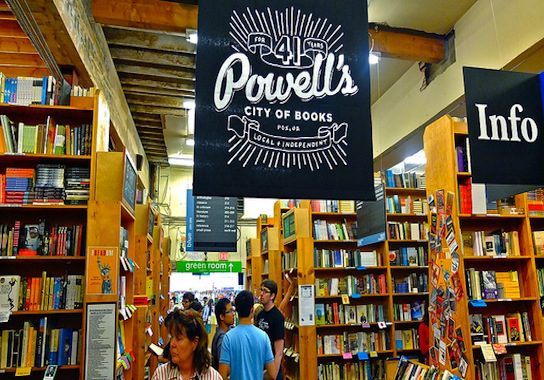The Bookstore Goes On

Ever heard of Powell’s Books? It’s a bookstore in downtown Portland that fills a whole city block. Its shelves contain more than one million new, used, and out of print books. Every room of the building contains a multitude of genres: the “Blue Room” contains literature, classics, poetry, and reference. The “Gold Room” has sci fi, mystery, romance, and thrillers. Browsing the floors could easily envelop an entire afternoon.
In this store, you want to take the stairs: they often contain interesting or amusing observations. For instance, take this white-on-red painted suggestion: “Burroughs for breakfast. Lovecraft for lunch. Dumas for Dinner. Be a literary omnivore.”
Originally founded in 1971, owner Michael Powell decided that he would mix used and new books on his shelves, creating a “synergy way beyond what we expected. If you put all the new books in one store and all the used books in another, each wouldn’t get half the total business — they drive each other.”
The store also includes a variety of planned events, including Kids’ Storytime, various and sundry book groups, book signings, and happy hour. Their Tumblr page divulges images of community, humor, and bibliophilic joy.
Powell’s is among several of the nation’s independent bookstores who are surviving in the age of e-readers and Amazon: according to a Friday blog post in the Economist, more independent bookstores have opened than closed in America since 2009. Sales grew by 8 percent in 2012, even while Barnes & Noble’s sales dropped 3.4 percent in its most recent fiscal year. The Economist article references Seattle bookseller Elliott Bay, a family-owned company “seen as a bit of a cultural icon.” The business is in “robust health,” experiencing steady growth in sales and customers:
When it was founded in 1963 Elliott Bay carried a few thousand titles. Now it has more than 160,000 and hosts almost two readings by authors a day, on average. Peter Aaron, the owner, explains that one of the main philosophies behind the store from the start has been that “We can’t do everything, so we have to do the right things and do them well.” That means stocking a thoughtfully chosen eclectic collection of books, filling the shop with staff who are first and foremost booksellers, and saying no to e-books.
Powell’s and Elliott Bay are classic examples of why independent bookstores thrive: on a mixture of old and new, serendipity and eccentricity, customer service and community. They know that competing with Amazon’s Kindle is foolhardy; rather, they “do the right things and do them well.”
Customers appreciate it, and return for the experience. As TIME pointed out in an article on Powell’s, these stores remain a place of beguiling exploration, where a customer can “cruise the aisles, grab some coffee and enjoy the lost art of thumbing through bound paper stamped with words.”
Comments